Abstract
Se llevó a cabo un experimento en el que diez palomas fueron entrenadas en una tarea de discriminación condicional de su propia conducta. Los sujetos aprendían que cuando la muestra había consistido en responder a la izquierda (derecha) ante dos teclas blancas, debían elegir la comparación roja (verde) para ser reforzados. Una vez que los animales habían aprendido esta tarea, se les pasaba a una fase de prueba. En concreto, cinco palomas fueron entrenadas en una transferencia positiva, ya que si la muestra era ahora la tecla roja (verde) tenían que elegir la comparación izquierda (derecha) para llegar al reforzador. Por el contrario, las otras cinco palomas recibían un entrenamiento de transferencia negativa, ya que la tarea consistía en que ante una muestra roja (verde) debían elegir la comparación derecha (izquierda) para ser reforzados. Los datos obtenidos indican que la ejecución de los sujetos del grupo en el que había coherencia entre las fases fue superior a la de los sujetos del grupo en el que no había dicha coherencia. Los resultados son interpretados en relación con la importancia que la discriminación de la propia conducta tiene en la derivación de relaciones bidireccionalesThis journal is registered under a Creative Commons Attribution 4.0 International Public License. Thus, this work may be reproduced, distributed, and publicly shared in digital format, as long as the names of the authors and Pontificia Universidad Javeriana are acknowledged. Others are allowed to quote, adapt, transform, auto-archive, republish, and create based on this material, for any purpose (even commercial ones), provided the authorship is duly acknowledged, a link to the original work is provided, and it is specified if changes have been made. Pontificia Universidad Javeriana does not hold the rights of published works and the authors are solely responsible for the contents of their works; they keep the moral, intellectual, privacy, and publicity rights. Approving the intervention of the work (review, copy-editing, translation, layout) and the following outreach, are granted through an use license and not through an assignment of rights. This means the journal and Pontificia Universidad Javeriana cannot be held responsible for any ethical malpractice by the authors. As a consequence of the protection granted by the use license, the journal is not required to publish recantations or modify information already published, unless the errata stems from the editorial management process. Publishing contents in this journal does not generate royalties for contributors.


